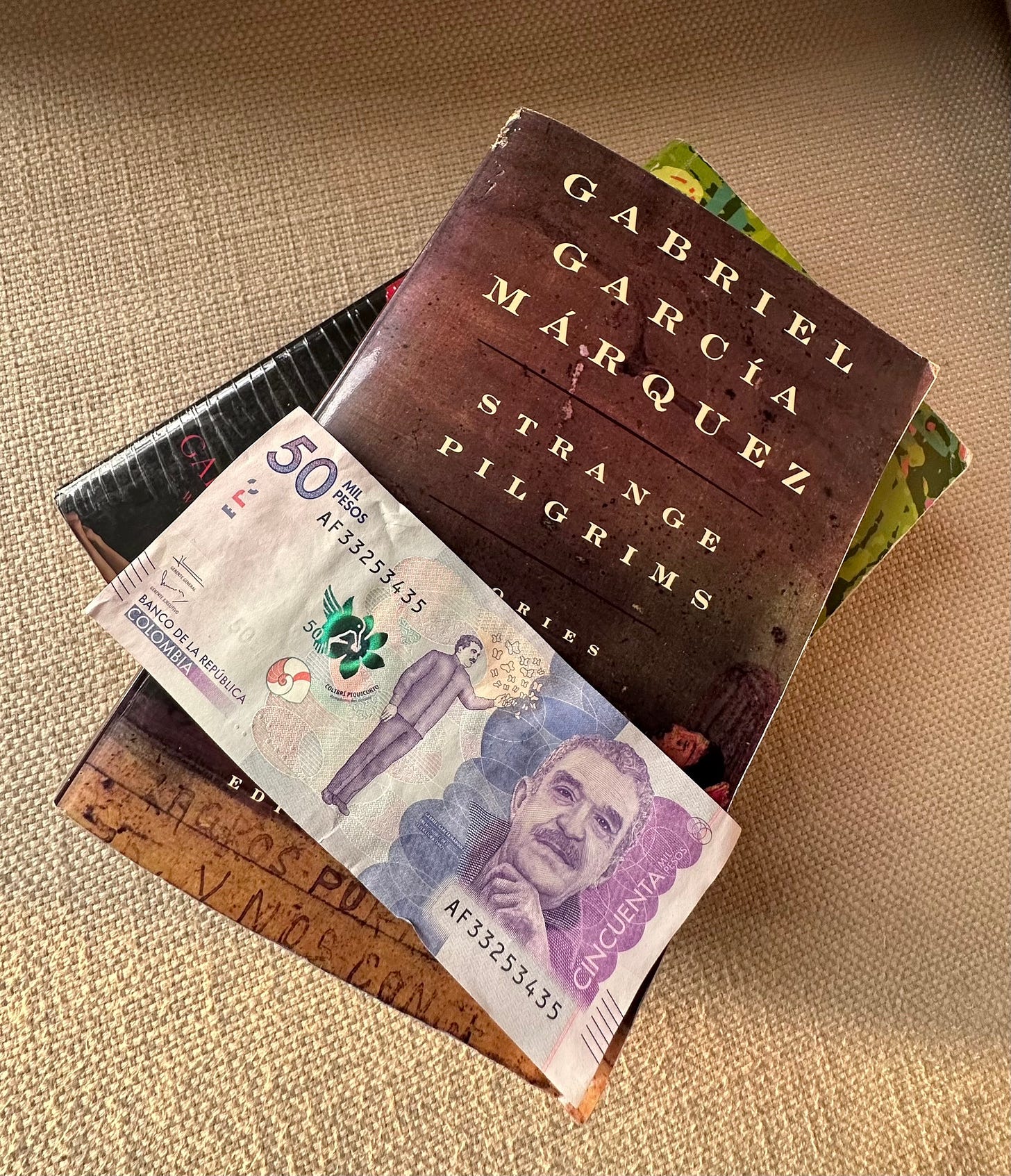Gabo.
Returning to a favorite author, anew.
I read all of Gabriel García Márquez’ Strange Pilgrims in a single, 4.5-hour swoop on the flight to Salt Lake City. Rarely, and much to my own personal disappointment, do I experience books in this way – I often feel that even the shortest read takes longer for me to finish than it should, leaving me to contend with a ‘to read’ list that will grow infinitely and forever. Never, in my life, will I be ‘caught up.’
So to finish all 12 stories in one sitting, especially sitting on a plane (a place that I have learned to approach with lowered expectations), was wholly unexpected. I have read and adored both Love in the Time of Cholera and One Hundred Years of Solitude – the latter I finished a handful of years ago on yet another flight, the remainder of which I spent staring through the clouds, suspended in a deeply strange kind of afterglow. I recognized the world of Márquez’ writing immediately, his signature realismo mágico thinning the veil between fantasy and reality. To consume it in short form feels akin to eating a cotton candy grape – a spectacular, seemingly unbelievable burst.
I remember reading an essay on craft at some point in college that praised the first sentence of One Hundred Years of Solitude as being the greatest opening sentence ever written. (Here is a different essay in a similar vein.) For context, that opening line is:
Many years later, as he faced the firing squad, Colonel Aureliano Buendía was to remember that distant afternoon when his father took him to discover ice.
Indeed, it is a sentence that contains multitudes (How does one 'discover' ice? Why is he facing a firing squad?), but in reading 12 other Márquez opening lines, I realize that One Hundred Years... was no fluke, the man was simply a master craftsman of the opening sentence. He was able to accomplish with stunning consistency what all first sentences strive to do: propel the audience head-first into a story, no questions asked, no choice but onward.
In revisiting Márquez’ work, I am reminded of the tender beauty in returning to art that resonated with ourselves in the past. A favorite author, or artist, or musician, or photograph – in these moments we are renewed, soothed by familiarity, invigorated again. The experience of revisiting permits for a moment of personal reflection, an examination of identity. There is a portion of the 'Lyrics' chapter in Rogers and Ogas' This is What It Sounds Like that applies well here:
Personal identity is a dynamic phenomenon. It changes across time and circumstances...Music, and lyrics in particular, serve as a kind of encyclopedia of personas for us to explore and adopt.
If lyrics serve as 'an encyclopedia of personas', then it seems natural that written word invokes a similar exploration of the self – Who was I the first time I read this? Do I still recognize that part of myself? Art requires that we ask these questions of ourselves every time we put ourselves in its path. The answer is always changed by circumstance, the experience of art and of the self a uniquely 'dynamic phenomenon.'
All this to say that I had missed Gabo without realizing, whichever part of myself that was attracted to his writing is still intact. I am glad to have picked this tiny book off the shelf, its text like some latent memory resurfaced. Familiar but new, the feeling of looking through water knowing your gaze has been skewed but bestowed with intangible sparkle. A heightened sense of shimmer.
— caro.
Listening to:
Bad Bunny, because Grammy’s opening performance (which I am unable to find in its entirety on YouTube):
And through proxy, lots of salsa:
Reading:
Oh, I’m on a bit of streak since the holiday break. This article about eating in the Cartagena region that hit my feed as I was boarding the plane, which of course I understood to be a sign. Sarah Manguso’s Ongoingness: The End of a Diary is so tiny (104 pages!) but so touching. A meatier but philosophically-juicy Sex and Sensibility from The Point, a journal that has the ability to make me feel like I’m back in an honors litcrit class (a good thing if that was not already obvious). And a recommendation (thanks, Ho) about the impact of winning or losing a Grammy on artists and the industry as a whole, relevant since I worked on the broadcast at the beginning of the month.



